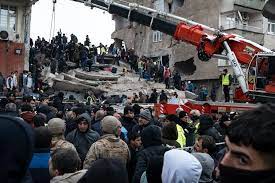Ashok Swain
Two powerful earthquakes struck Turkey and Syria on February 6 have killed close to 50,000 people, and the number is likely to rise further. It is estimated that damages from the devastating earthquake may exceed $20 billion, though it is still early to measure the full impact.
Seventy-four countries and several international organisations have sent rescue workers, relief materials, and medical supplies to help the stricken region. Significant support to Turkey has come from NATO member countries led by the US. Besides helping the affected population, post-earthquake disaster support is also expected by some that it may help to better relations between relief-receiving and relief-giving countries.
In recent months Turkey has tried to improve its relations with Syria, and the shared misery from the disaster may expedite that process. However, several commentators and analysts are expecting disaster aid, particularly from the US, and the EU may repair their troubled ties with Turkey to some extent. Turkey has also received generous support from countries like Armenia, Greece, Israel, and Sweden.
However, Turkey has a long-standing conflictual relationship with Greece and Israel. Both these countries have not only sent relief materials and rescue workers, but their foreign ministers have also visited Turkey’s earthquake-affected areas to express sympathy and show their solidarity. Speaking at a press conference in Ankara with visiting Israeli counterpart, Turkey’s foreign minister gave an encouraging message of normalising Turkey’s relations with the countries in the Eastern Mediterranean region, particularly Israel and Greece.
He was very categorical about the possible outcome of the disaster diplomacy: “We want stability and peace in our region. The steps we have taken to normalize our relations with the countries of the region, especially with Israel, are obvious. I hope our solidarity during this earthquake will also be decisive in opening a new page with Greece.” Undoubtedly, the earthquake brought massive destruction and immense misery to Turkey, but will it be a catalyst for improving relations with some countries during this challenging time?
To map the links between disaster and diplomacy has been an interest of many years. Can disaster relief change the dynamics of a conflict and provide a pathway for peacemaking? In the case of internal armed conflicts, the example of the peace agreement between Indonesia and the Free Aceh Movement signed a year after the Indian Ocean tsunami is often given to argue how disaster response brought out the political will to negotiate for peace.
But those who give Aceh as an example of disaster-driven peace tend to forget that the international aid mechanism in response to the same tsunami became a major reason for creating serious hindrances to the peace process between the Sri Lankan government and Tamil rebels. In the past, Cuba refused aid from the US while suffering from a devastating drought, and the USA did the same when Cuba offered support following Hurricane Katrina. The post-disaster settings, in some cases, provide an opportunity for transforming conflict behavior towards cooperation and conflict resolution. Natural disasters can incentivize countries in the conflict to cooperate by delegitimizing divisions and increasing mutual trust.
When a country, despite ongoing disputes and long-standing mistrust, offers critical aid and assistance in the aftermath of a terrible disaster, it can help to build goodwill and trust between the two nations. Disaster relief efforts allow the two countries to work together to address a common challenge, which can help build relationships and foster cooperation in other areas.
However, for disaster diplomacy to be successful, political leaders must be willing to take advantage of the short-term window of opportunity the disaster-related activities offer. In 2008, Japan provided disaster relief and humanitarian assistance to China aftermath of the earthquake in the Sichuan province, and China also reciprocated in 2011, when Japan suffered from a devastating earthquake and tsunami. Pakistan provided significant support to India after the 2001 earthquake, and India also provided relief supplies to Pakistan after the earthquake in 2005 and floods in 2010. The evidence of cooperation and collaboration induced by a natural disaster are mixed, though invariably, disaster diplomacy helps to improve the people-to-people to relations. However, improved people-to-people relations do not always alter the direction of the bilateral relationship.
Disaster diplomacy offers short-term opportunities to resolve conflicts, but pursuing those opportunities or not is dependent upon the leaders of the countries and their political-strategic calculations. The world needs to wait and watch if disaster diplomacy can bring long-term peace to the Eastern Mediterranean region or not.
Gulf News







